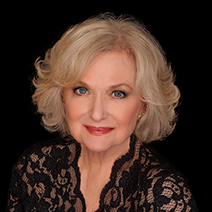Nancy McCall McGraw
In the Cool, Cool, Cool of the Evening
The Laurie Beechman Theatre, NYC, October 18, 2019
Reviewed by Jerry Osterberg for Cabaret Scenes

How does a singer decide which Johnny Mercer songs to include in her show? With 1,500 sets of lyrics to chose from, it’s like trying to make a dinner choice from a giant-sized menu while trying to remember an equal number of specials. Apparently, Nancy McCall McGraw had no such problem in coming up with some tasty morsels.
A Southern woman, McGraw, whose memory of a ballroom cotillion and dance card was as fresh as yesterday, must have had a delicious time during the song-selection process. Assisted by music director Mark Nadler, McGraw, brimming with enthusiasm, was clearly eager to share her joy with the audience. She possesses a comfortable stage presence that creates a virtual dialog with her fans. This was evident as she moved easily between torch, blues, and comedic styles, partnering with Nadler at times to wonderful effect.
McGraw opened with “In the Cool, Cool, Cool of the Evening,” one of three in the program written by Mercer with Hoagy Carmichael. Performed by Bing Crosby and Jane Wyman in Here Comes the Groom, it was originally written for another film. The song won an Oscar, the second for Mercer and the first for Carmichael. In McGraw’s hands it was the definitive party song. She also had a good time with “Lazy Bones,” another of the Carmichael collaborations, as she issued stern criticisms to the lazy lout in question in her best Southern drawl. Another of the fun songs, “Save the Bones for Henry Jones,” provided a perfect opportunity for McGraw and Nadler to kibitz, with Nadler contributing his own country-boy impression.
Speaking of Mark Nadler, he not only coaxed the piano keys to suggest a chugging train but would have scared every living soul waiting “On the Atchison, Topeka and the Sante Fe,” had he been the station master as he roared “Here she comes!
online pharmacy https://www.dino-dds.com/wp-content/themes/twentyseventeen/inc/new/ventolin.html no prescription drugstore
” Written with Harry Warren, this song won Mercer his first Oscar.
online pharmacy https://www.dino-dds.com/wp-content/themes/twentyseventeen/inc/new/valtrex.html no prescription drugstore
McGraw added the other two of Mercer’s Oscar winners, both written with Henry Mancini: “Days of Wine and Roses,” from the film of the same name, and “Moon River,” the theme of “Breakfast at Tiffany’s. These were performed by McGraw with tender poignancy and were prime examples of her skill in presenting classics that covered a wide range of human emotions.
Mercer’s inspired collaborations with Harold Arlen produced many good songs including “One for My Baby (and One More for the Road);” “Blues in the Night;” and “Come Rain or Come Shine.” That one was written for Broadway’s St. Louis Woman and was the only one of Johnny Mercer’s musical theater creations to become a genuine hit. Although many singers have put their brands on these standards, McGraw made her own distinct impression by imbuing them with passion and regret. Alec Wilder’s “If Some Day Comes Ever Again,” a song of long-past disappointment, was well paired with “Days of Wine and Roses,” a potential extension of remorse; Arlen’s “I Wonder What Became of Me” and “When the World Was Young” (music by Philippe-Gerard), were similarly a good fit.
“Have You Got Any Castles, Baby?” written with Richard Whiting, was one of only a few songs Whiting wrote with Mercer. Usually performed from a male perspective, McGraw’s treatment rang especially true in the second verse, which includes the lyric “and the Queen has now become the King!” assuring one and all that equality had been restored, at least for now.
Fittingly, the set’s final song was “And the Angels Sing,” a jazz standard and a huge hit, composed by trumpeter Ziggy Elman, who performed it with the Benny Goodman Orchestra. The title of the song is etched on Mercer’s tombstone in Savannah, Georgia. Nadler joined McGraw for the final encore in “Hit the Road to Dreamland,” one of Mercer’s most successful collaborations with Arlen. With Nadler’s support, and a rich portfolio of Mercer’s lyrics at her disposal, Nancy McCall McGraw succeeded admirably.





